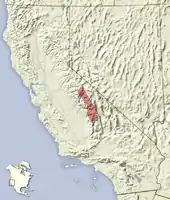Alpine chipmunk
The alpine chipmunk (Neotamias alpinus) is a species of chipmunk native to the high elevations of the Sierra Nevada of California.[2][3]
| Alpine chipmunk | |
|---|---|
.jpg.webp) | |
| Scientific classification | |
| Domain: | Eukaryota |
| Kingdom: | Animalia |
| Phylum: | Chordata |
| Class: | Mammalia |
| Order: | Rodentia |
| Family: | Sciuridae |
| Genus: | Neotamias |
| Species: | N. alpinus |
| Binomial name | |
| Neotamias alpinus Merriam, 1893 | |
| Synonyms | |
|
Tamias alpinus Merriam, 1893 | |
Description
Alpine chipmunks share the typical pattern of genus Neotamias, being gray-brown overall and featuring three white stripes on the cheeks and four down the back. The flanks are muted orange. Overall the pattern is much paler compared to most species. They weigh 27-45 grams.[4]
Distribution

Alpine chipmunks only live in high Sierra Nevada, from Yosemite National Park in the north, to Olancha Peak in the south. They have been observed at altitudes from around 2,300 meters (7,500 ft)[5] to 3,900 meters (12,800 ft),[6] though they rarely occur below 2,500 meters (8,200 ft).
Behavior and ecology
The alpine chipmunk feeds on the seeds of sedges, grasses, and other plants in their namesake alpine zone.[4] They generally eat their food on the ground. They do not generally require a source of water other than food, but will use it given the opportunity.
They nest in crevices between rocks, taking advantage of the micro-climatic conditions (i.e. higher temperatures) that exist there. Their young are born in June and July, in litters of 3–6.
They are considered diurnal, though they exhibit some nocturnal activity during the summer. They hibernate from November through April, frequently awakening to eat.[5]
References
- Cassola, F. (2016). "Neotamias alpinus". IUCN Red List of Threatened Species. 2016: e.T42568A22266784. doi:10.2305/IUCN.UK.2016-2.RLTS.T42568A22266784.en. Retrieved 13 November 2021.
- Hall, E.R. (1981). The Mammals of North America (2nd ed.). New York: John Wiley & Sons.
- Grinnell, J.; T.I. Storer (1924). Animal life in the Yosemite: an account of the mammals, birds, reptiles and amphibians of a cross-section of the Sierra Nevada. University of California Press.
- Clawson, Robin G.; Clawson, Joseph A.; Best, Troy L. (1994). "Tamias alpinus". Mammalian Species Archive. 461.
- Johnson, D.H. (1943). Systematic review of the chipmunks (genus Eutamias) of California. University of California Publications in Zoology.
- Swarth, H.S. (1919). Some Sierran chipmunks. Sierra Club Bulletin.
External links
- Hole Jr., Robert. "Alpine Chipmunk Tamias alpinus". Encyclopedia of Life Field Guides. Archived from the original on 2016-03-04. Retrieved 7 December 2012.
